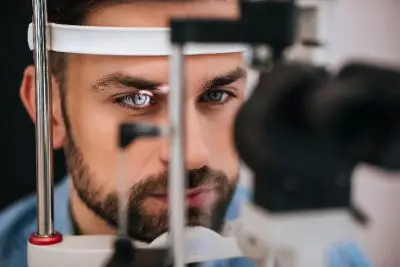What are Retina Doctors?
Our doctors are retina and macula experts who have been trained to perform exacting treatments on this very delicate part of body using the most advanced technology available. Our goal is to promptly diagnose and treat disorders that threaten your vision and ocular health.
Patients with retinal conditions in the Brisbane area often seek care at the Eye Health Centre because of our expertise in this field. Our retinal specialists have studied at top universities and undergone the most prestigious retina-related fellowships in Australia, New Zealand and the United Kingdom. We provide both surgical and less-invasive solutions to our patients so that they may preserve as much of their vision as possible.

The Eye Health Centre is home to qualified Brisbane retinal specialists who provide medical and surgical care for conditions affecting the retina, macula and vitreous.
The retina is a thin layer of tissue located at the back of the eye. After light passes through the front of the eye, the retina is responsible for transmitting information from the light to the brain. The macula is the centre of the retina and important for fine detail vision.

What Happens during an Initial Meeting with a Retinal Specialist
When you arrive to your first appointment, you will be asked to share your medical history, including any medications you are taking. Afterwards, your eyes are dilated so that the doctor can examine the back of your eyes for potential problems. High-tech images are taken of the eyes and a series of tests are conducted to identify retinal disease or tears, or to check on the progression of a known retinal condition.
Next, our specialist takes time to explain any conditions that are detected in detail. Please ask any questions you may have because we are committed to keeping you informed and comfortable throughout the process.
Retinal appointments usually last longer than the average medical appointment, so plan to be at our office for at least a couple hours. Because your pupils stay dilated for several hours, we ask that you arrange to have someone drive you home from your appointment.
Symptoms of Retinal Conditions
Changes that may indicate a problem with the retina include:
- Diminished or distorted central vision
- Floaters (or specks of light)
- Double vision
- Straight lines look wavy
- Blurry vision
Some of these symptoms overlap with other serious eye conditions unrelated to the retina. If a comprehensive eye examination determines you do not have a retinal condition, we have other doctors on staff who can address the relevant problem.
Our retinal, macula and vitreous services include the following:
Macular Degeneration
Macular degeneration is a common aging change that occurs at the centre of the retina. Wet macular degeneration can cause fluid buildup or bleeding and requires urgent treatment to maintain good vision.
Treatment with a course of specialized eye injections which deliver drugs to remove the fluid is often necessary.
Retinal Detachment
A retinal detachment occurs when the retina separates from the back wall of the eye. It is usually caused by aging changes in the vitreous gel which fills the eye.
A detached retina is considered an emergency that requires immediate medical attention. Several surgical procedures can treat retinal detachment, including:
- Vitrectomy – the vitreous gel is removed and the retina repaired with microsurgery.
- Scleral buckling – a silicone ‘buckle’ is attached around the eye to stop the vitreous gel from pulling on the retina. Pneumatic retinopexy, which uses a carefully placed gas bubble to push the retina back against the wall of the eye.
Macular Hole
A macular hole is an aging change which affects the central, high detail vision. It is most often caused by aging of the gel which fills the eye, the vitreous, which can tug on the macula and cause a hole.
The symptoms and treatment for macular hole depend on the size or stage of the problem. Treatment can involve watchful waiting and monitoring of the hole, to repairing the hole with a surgery called vitrectomy, which is often very successful.
Flashes and Floaters
Flashes and floaters are most common in individuals over the age of 50. They are also related to problems with the vitreous. As the vitreous ages, clumps or strands can float around in the gel that we can perceive as objects floating around in our field of vision. The vitreous may also tug on the retina, sending electrical impulses to the brain that the brain interprets as flashing or flickering lights (“flashes”). Sometimes flashes are a warning sign of a retinal tear or hole.
A sudden onset of floaters or flashes could indicate a problem and should be evaluated urgently by our retinal specialists to determine whether treatment is needed.
Central Serous Chorioretinopathy
Central serous chorioretinopathy describes a buildup of fluid under the macula which can interfere with central vision. The most common symptom is developing hazy central vision in just one eye, although sometimes this symptom is not obvious enough for a person to identify.
In most cases, central serous chorioretinopathy resolves on its own. Other cases that do not clear up by themselves or that cause significant vision loss can be treated with laser treatment or photodynamic therapy.
Retinal Vascular Disease
Retinal vascular disease refers to problems with blood vessels in the retina and macula. When blood flow to or from the retina is compromised, it can lead to visual impairment and vision loss. Examples of retinal vascular disease include:
- Retinal vein occlusion (RVO)
- Retinal artery occlusion (RAO)
- Hypertensive retinopathy
- Diabetic retinopathy
- Ocular ischaemic syndrome
Treatment for retinal vascular disease is tailored to the specific problem and its severity but can include observation, retinal laser or eye injections. The main goal of treatment is to improve your vision and prevent further complications.
Diabetic Eye Disease
People with diabetes are at a higher risk of developing certain eye diseases, including diabetic retinopathy, diabetic macular edema, glaucoma and cataracts. The team at The Eye Health Centre encourages anyone with diabetes to stay on top of their ocular health with routine eye examinations.
Keeping your blood sugar levels steady will help to minimize vision problems. If a problem occurs, our doctors offer various treatment solutions, including eye injections and retinal lasers to minimize damage from the diabetes and improve your vision.
Uveitis
Uveitis is a general term for inflammation of the eye. The inflammation can cause symptoms such as red eyes, blurry vision, sensitivity to light or the perception of floaters. Uveitis can be caused by other diseases in the body and so treating uveitis often depends on the cause. Prompt treatment is recommended to prevent lasting adverse visual effects.
If you are experiencing symptoms that suggest something is wrong with your retina, our doctors are here to help. Request a consultation with us by calling or emailing us today.
Retinal Tear
When the vitreous pulls on the retina with too much force, it can cause the retina to rip from the back wall of the eye, creating a retinal tear. Because retinal tear can lead to retinal detachment (which in turn can cause blindness), it is imperative to catch and treat this condition quickly.
Retina Conditions FAQ
How do doctors detect retina disease?
Retinal diseases and disorders are most often identified during comprehensive eye exams. During your annual examination, your eye doctor will put drops in your eyes that are designed to dilate your pupil. Afterwards, your doctor will be able to look more closely at the retina and macula.



